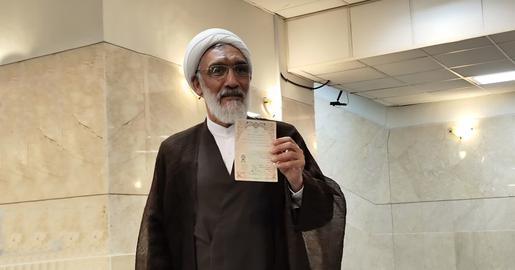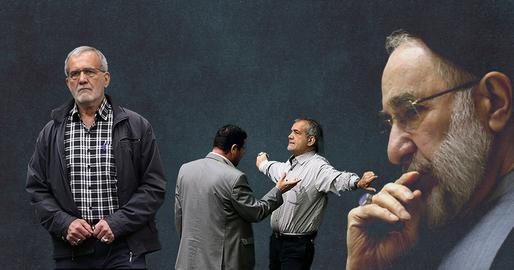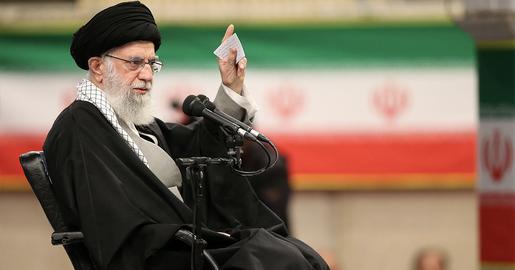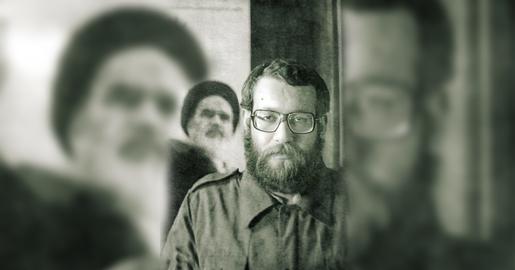Hossein Amir-Abdollahian, the tenth foreign minister of the Islamic Republic of Iran, faced a unique set of challenges during his tenure.
He succeeded Mohammed Javad Zarif, a widely popular and internationally recognized minister.
Zarif's term ended in controversy, marked by his leaked audio file criticizing Qassem Soleimani and the foreign policy under Hassan Rouhani's government.
This leak led to Zarif's political downfall.
Unlike Zarif, whose relationship with Supreme Leader Ali Khamenei soured towards the end, Amir-Abdollahian enjoyed a smoother start.
In the leaked audio, Zarif mentioned that John Kerry, the former US Secretary of State, once contacted him about a Yemen ceasefire.
Due to restrictions from Khamenei on non-nuclear negotiations, Zarif referred Kerry to Amir-Abdollahian, who was then his deputy.
Zarif recounted telling Kerry to call Amir-Abdollahian, who would relay the message to Soleimani to secure the ceasefire.
Despite Amir-Abdollahian's enthusiasm and anticipation of success, Kerry never made the call, and the ceasefire did not materialize.
Amir-Abdollahian maintained a respectful and modest demeanor, even when taking over from Zarif.
He refrained from publicly addressing Zarif's statements about the failed ceasefire negotiation.
Instead, he acknowledged Zarif with respect and invited him to consult with other former foreign ministers, a gesture unprecedented in Iran's diplomatic history.
Unlike Zarif, Amir-Abdollahian did not need to publicly affirm his loyalty to Khamenei, as his trustworthiness was well-established.
After he was removed from the position of Deputy for Arab Affairs at the Ministry of Foreign Affairs during Zarif's tenure, he served two terms as Deputy for International Affairs in the parliament during Ali Larijani and Mohammad Bagher Ghalibaf's speakership.
When introduced to the parliament by Ebrahim Raisi as a minister, he received a vote of confidence that surpassed Zarif's, facing almost no opposition, and became the minister.
Upon his return to the Ministry of Foreign Affairs, this time as the minister, it was anticipated that a trusted government ally would take the helm, reinvigorating the institution responsible for the country's diplomacy.
Amir-Abdollahian had long been involved with the Ministry of Foreign Affairs as the officer for Arab countries' affairs and had also served as the ambassador to Bahrain.
His close relationship with the Quds Force, the overseas branch of the IRGC, was well-known.
During his tenure as deputy minister, he was often referred to as Soleimani's representative within the Foreign Ministry—a situation that persisted until midway through Zarif's ministry.
When Amir-Abdollahian became the minister, there was initial speculation that regional issues, which had largely been managed by the IRGC during Zarif's time, would revert to the Ministry of Foreign Affairs.
However, not only did this shift not occur, but the nuclear dossier was also removed from the Ministry's purview and handed over to the Supreme National Security Council.
Ali Bagheri Kani, Amir-Abdollahian's deputy and the current head of the ministry, was in charge of nuclear negotiations, reporting not to the minister but directly to the Supreme National Security Council.
Amir-Abdollahian played no central role in the nuclear negotiations, and his statements regarding the initiation of negotiations by the United States were consistently denied by the US State Department.
In 2022, during the first year of his ministry, the most unprecedented protests in the history of the Islamic Republic erupted with the Woman, Life, Freedom movement, which faced severe government repression.
At the time, Amir-Abdollahian was in New York with Raisi, where he denied any suppression, killings, or the use of firearms against protesters.
In an interview with Christiane Amanpour on CNN, six months into the suppression, he denied clear and deadly events, leading to Amanpour's sharp rebuke in Farsi.
His infamous claim that there were no protestors arrested in Iran circulated widely on social media.
A month before his death, in the context of the IRGC's first direct attack on Israel from Iranian soil, the IRGC summoned the Swiss ambassador, who represents American interests in Tehran, to inform the United States that this attack was orchestrated by the IRGC and to warn Washington against military retaliation.
This was unprecedented, as it marked the first time the Ministry of Foreign Affairs summoned the Swiss ambassador.
When the advisor to the Iranian Minister of Interior made this public, the Iranian Foreign Ministry's spokesperson confirmed that the IRGC had indeed assumed the authority to summon foreign ambassadors in Tehran.
Pakistan severed its relationship with Iran following the IRGC's missile attack on its territory and the subsequent barring of the Iranian ambassador's return to Islamabad during the final six months of Amir-Abdollahian's ministry.
Shortly before this incident, Nechirvan Barzani, the Prime Minister of the Kurdistan Region of Iraq, canceled a meeting with Amir-Abdollahian after the IRGC targeted a location within the region.
However, Pakistan quickly reestablished relations with Iran after a retaliatory military strike, and President Raisi was subsequently hosted by the Pakistani Prime Minister.
Barzani also visited Tehran and met with Amir-Abdollahian in his last weeks.
Neither the deterioration nor the restoration of these relations was initiated by the Minister or the Ministry of Foreign Affairs.
Former Foreign Minister Zarif’s comments about the IRGC's negative impact on Iran's regional relations even irritated a minister known to be an IRGC member close to the Quds Force.
During Amir-Abdollahian's tenure, attempts were made to renew relations with Sudan and the Maldives.
However, it wasn't until Saudi Arabia reestablished its relationship with Iran, mediated by China and involving the Secretary of the Supreme Security Council, that neither Sudan nor the Maldives resumed diplomatic ties with Tehran.
Here too, the Ministry of Foreign Affairs played a secondary role. Bahrain, where Amir-Abdollahian had his only ambassadorial experience, severed ties until his death.
However, the Egyptian Foreign Minister attended the memorial for Raisi and Amir-Abdollahian, marking the first visit of an Egyptian Foreign Minister to Iran since the 1979 Revolution.
In the last eight months, following Hamas's attack on Israel, Amir-Abdollahian had multiple meetings with regional officials, including the Egyptian Foreign Minister and leaders of militant groups like Hamas, Islamic Jihad, and Hezbollah, which are proxies of the Islamic Republic.
The outcomes of these meetings are unknown, but it was after one such meeting that Israel targeted the Islamic Republic's consulate in Damascus, resulting in the death of several IRGC members and a senior Quds Force commander.
Amir-Abdollahian's subsequent mission was to reopen the consulate in a new building.
Recently, there have been reports of direct Middle East crisis talks between Iran and the US, hosted by Oman, involving representatives from the Ministry of Foreign Affairs.
Due to the confidential nature of these negotiations, details are unclear, and even the occurrence of these talks is uncertain.
If true, it would be one of the last efforts of Amir-Abdollahian's ministry, which ultimately failed.
In recent months, he traveled to New York and the United Nations headquarters multiple times.
He addressed the Security Council twice in the past six months.
His final trip was to attend the inauguration of a border dam between Iran and the Republic of Azerbaijan, attended by both countries' presidents.
Despite the closure of Azerbaijan's embassy in Tehran following a shooting incident and the killing of an Azerbaijani agent, Iranian officials saw this event as a chance to mend relations.
The two presidents met, and a few hours after the ceremony, he died in a helicopter crash with the president.
Like many foreign ministers post-revolution, his career did not conclude happily.
Despite being a trusted member of the IRGC, he failed to reclaim the authority lost during Zarif's period, as the ministry's power effectively resided with the IRGC.

























comments